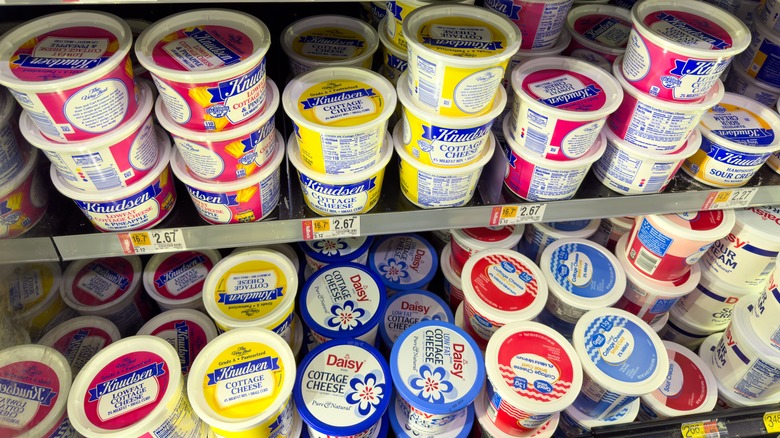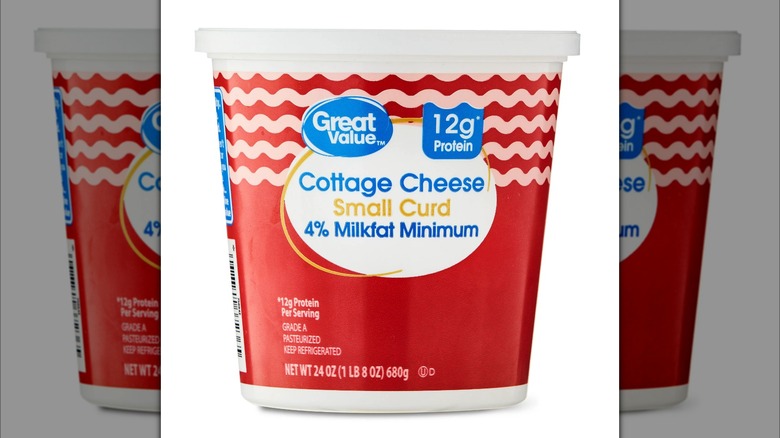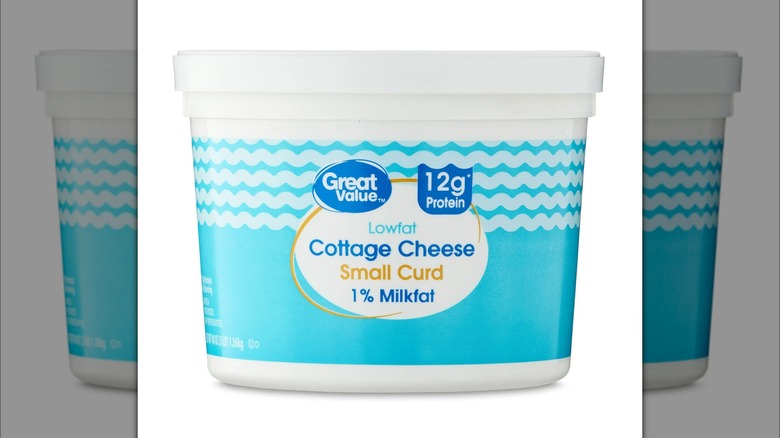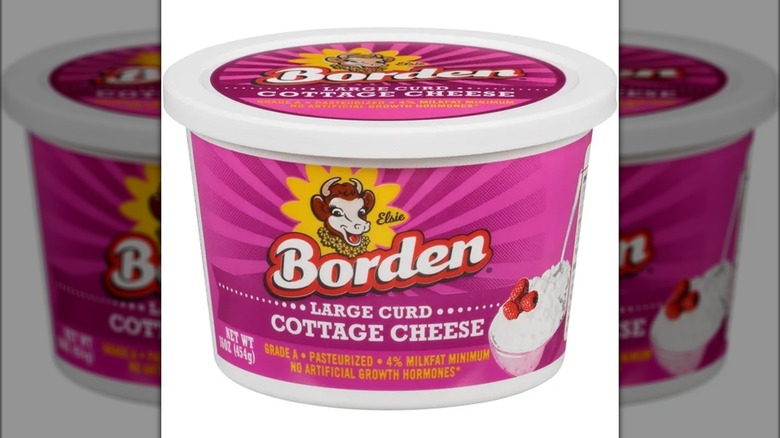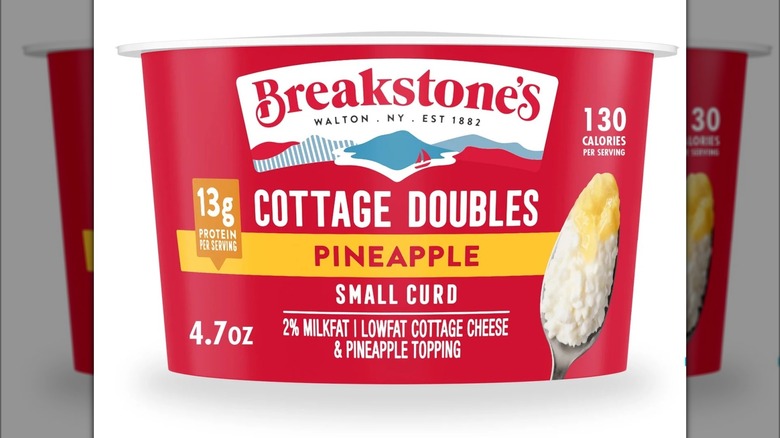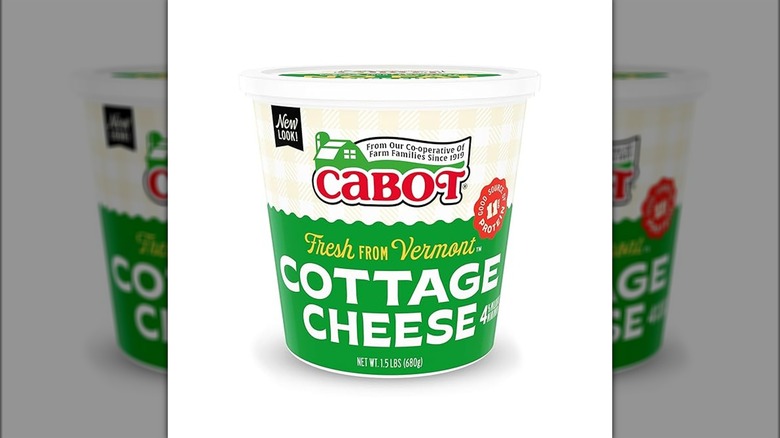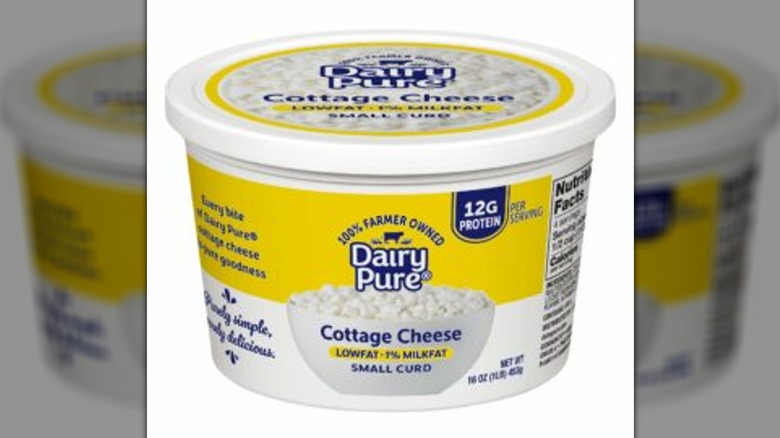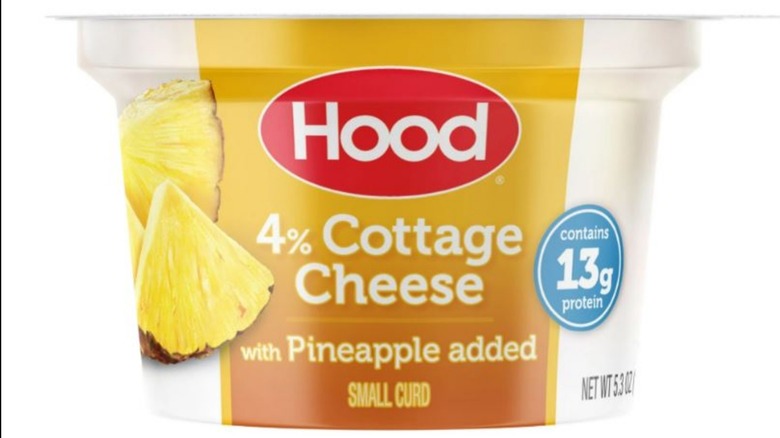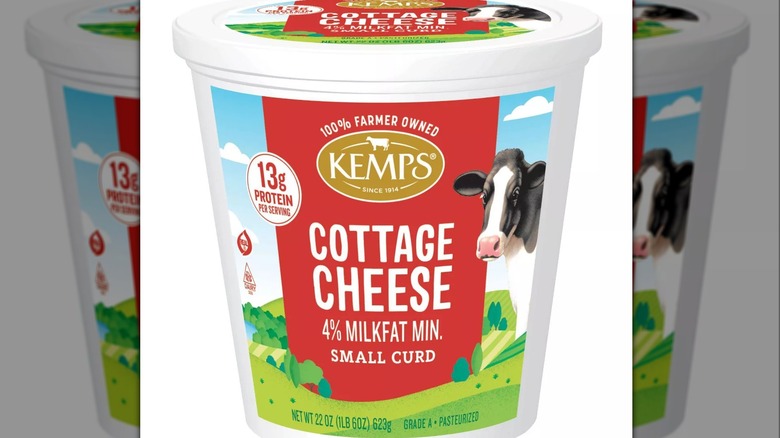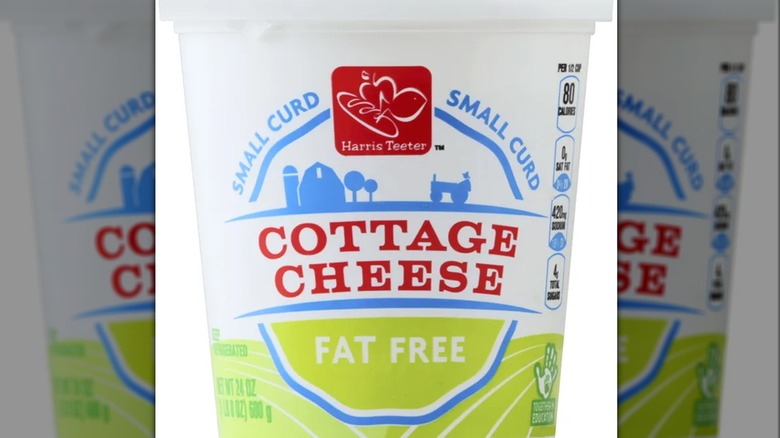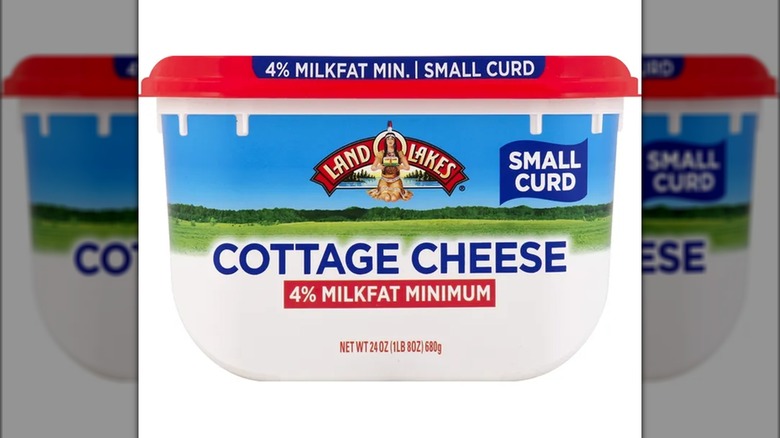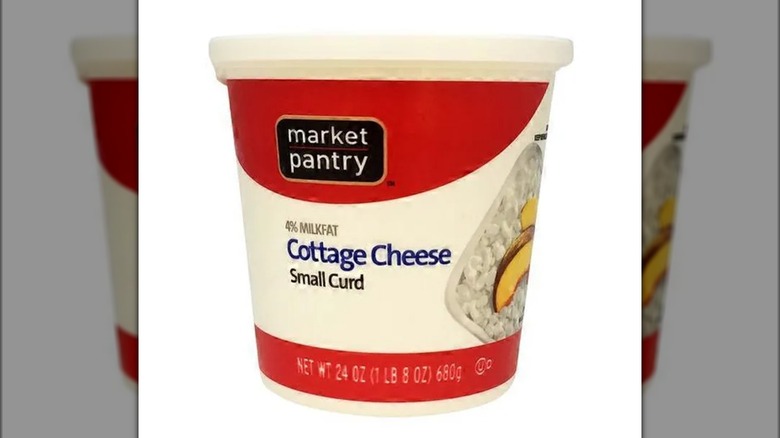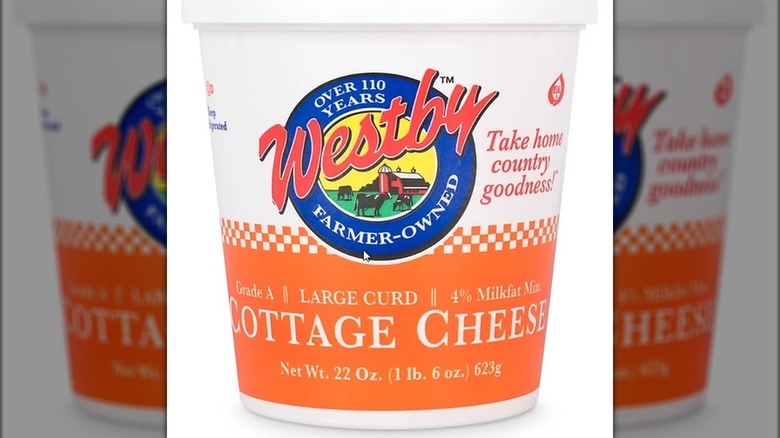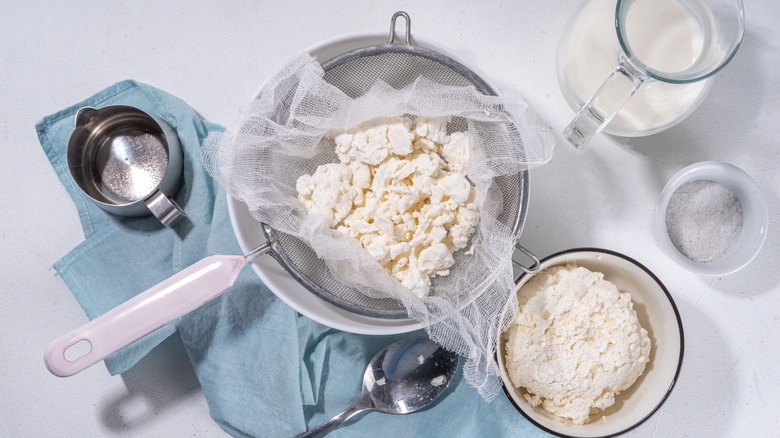The Most Unhealthy Store-Bought Cottage Cheese You Can Buy
We may receive a commission on purchases made from links.
While looking for a healthy protein option that won't require eating tons of meat or eggs, you'll likely find yourself face to face with cottage cheese. This dairy product has become a staple in the diets of athletes and fitness experts as a low-calorie and high-protein offering. Made simply from the curds of cow's milk, without the pressing or aging of other cheese varieties, cottage cheese has a mild flavor and a pleasing mouthfeel from small- and large-sized curds.
Owing to its plain flavor, cottage cheese goes well with nearly every ingredient, making it the ideal base to pair with your eggs, toast, vegetables, and fruits. Try making a rich cottage cheese ice cream if you don't believe it. However, many store-bought cottage cheese products will compromise on their health benefits, which include aiding in weight loss and muscle gain, by adding excessive sodium, sweeteners, and artificial flavors to enhance the taste.
We took to the shelves to examine cottage cheese brands with the least-healthy ingredients, highlighting additives and preservatives such as carrageenan that should be limited in your diet owing to their potential for health risks. Below you'll find the cottage cheese brands to avoid on your next grocery run, or at least limit until there's a healthier one in sight.
1. Great Value 4% Milkfat Small Curd Cottage Cheese
A reliable choice at Walmart is the Great Value brand, known for its variety of products at affordable prices. Those looking for a full-fat cottage cheese may opt for this 4% product, as that level is creamier and more fulfilling than the low-fat options. However, make sure to check the label before buying. While positive terms such as 12 grams of protein and Grade A milk are on the front, more concerning ingredients get lost in the fine print.
This product is similar to the U.S. Department of Agriculture (USDA) nutrition record for store-bought cottage cheese, but it possesses higher amounts of sodium and fat. Every 113-gram serving has 5 grams of fat, of which 3 grams are saturated. Although the research on saturated fats affecting heart health is ongoing and inconclusive, it's better to stick to the American Heart Association recommendation of 5%-6% of your daily calories coming from saturated fats. This product also has 400 milligrams of sodium per serving, which is nearly a third of the American Heart Association's recommended amount of daily salt intake of 1,500 milligrams (the upper limit is 2,300 milligrams, but the group advises moving toward the lower level).
The ingredients include artificial thickeners such as xanthan gum and guar gum added to keep the cottage cheese from separating. However, The Cornucopia Institute's healthy cottage cheese guide identifies such non-organic gums to be unnecessary additives and to pick a brand that uses the least thickeners.
2. Great Value 1% Milkfat Lowfat Small Curd Cottage Cheese
Consumers concerned about eating a full-fat cottage cheese will opt for low-fat options like Great Value 1% milkfat cottage cheese. The product has small curds, and if you've wondered how cottage cheese gets made into small curds, it's the work of a curd cutter. However, low fat doesn't promise healthy, as the label reads 400 milligrams of sodium per serving, listed as one of the "less than 2%" ingredients. There are also 4 grams of total sugars. The sugars in most cottage cheese products come from lactose in the milk. So for those with lactose intolerance, cottage cheese might trigger their intolerance symptoms, but only when it's consumed in excess.
An ingredient to look out for in the Great Value 1% low fat cottage cheese is carrageenan. Carrageenan is added during manufacturing in vegan and vegetarian products to replace gelatin and improve mouthfeel. However, it's a controversial food additive that has been linked to inflammation, irritable bowel syndrome (IBS), glucose intolerance, and colon cancer (via Healthline). Although the research on carrageenan mostly contains animal studies, there could be a risk in humans. So it's best to limit your carrageenan intake until more conclusive research comes to light or safe levels are established. The cheese also has thickeners like guar gum, modified food starch, and some preservatives. Considering the excessive additives and sodium in this product, it might not add as much great value to your health as the label indicates.
3. Borden Large Curd Cottage Cheese
A reliable name in dairy products, Borden is regarded as a household brand for many and is recognizable by its happy cow mascot, Elsie. With a range of dairy products and a history behind the name dating back to 1856, Borden is an easy choice for consumers when getting their cottage cheese fix. However, whether the company's large curd cottage cheese is a healthy option is debatable. With 450 milligrams of sodium per ½ cup serving, this product raises questions about whether a wholesome food option like cottage cheese needs to be this salty.
A look at the label reveals a paragraph of alien-looking ingredients, few of which bear any nutritional value. There is corn starch for thickening, titanium dioxide for artificial color, the questionable carrageenan to add texture, and quite a few preservatives and additives like potassium and calcium phosphates, calcium sulfate, and potassium sorbate. The ingredient bearing concern here is titanium dioxide, which the European Food Safety Authority declared as unfit to be a food additive in a safety assessment in 2021 due to its possible risk of inflammation and neurotoxicity. However, the U.S. Food and Drug Administration (FDA) categorizes it as generally recognized as safe (GRAS), so manufacturers continue to use it in food to add a bright white hue for product appeal. With so many additives, it's difficult to see the healthful benefits generally associated with this cottage cheese product, so it's safe to pass for an option with more organic ingredients.
4. Breakstone's Fruit Cottage Cheeses
For those of us who don't prefer the bland flavor of plain cottage cheese, fruit-flavored versions are a great way to enjoy them. That's one of the reasons why TikTok can't get enough of cottage cheese – it pairs well with sweet and savory ingredients alike. Breakstone's fruit cottage cheese promises a healthy protein fix on the go, with mango, peach, pineapple, black cherry, and berry flavors. Mostly similar in nutritional value, the fruit cottage cheeses pack 400 milligrams of sodium per serving, which is considerably high for a sweet cheese with little discernible salt flavor.
Each half-cup serving also has 14 grams of carbs and a whopping 11 grams of sugar, with 4 grams being added sugars. Although added sugars are expected in a sweetened product, what's concerning is that fruit products are usually consumed by children, so it's important to monitor their sugar intake. There are also thickeners in this cottage cheese including tapioca starch and modified food starch, the latter of which is a highly processed ingredient with little nutritional value. It also contains the preservative potassium sorbate. The saving grace of Breakstone's cottage cheese is its 13 grams of protein per serving, but combined with other ingredients bearing less-than-healthy nutrients, it's probably best to consume infrequently.
5. Cabot 4% Cottage Cheese
Next on the list is Cabot Creamery's 4% milkfat cottage cheese. Coming from the brand's legacy of family farming in New England, Cabot is a name most will easily gravitate toward while shopping at the grocery store. However, before you buy your next tub of cottage cheese from Cabot, give the ingredient label a glance. Nutritionally, this cottage cheese is not much different from others on this list, packing elevated nutrient quantities including 420 milligrams of sodium, 3 grams of sugar, and 2.5 grams of saturated fats per half-cup serving.
If these weren't enough to make you reconsider the cottage cheese, take a look at the ingredients. The product uses carrageenan and guar gum, mentioned among the "less than 1%" ingredients, but both are a part of The Cornucopia Institute's list of ingredients to avoid in cottage cheese. While research on carrageenan being linked to possible digestive troubles and colon cancer needs further studying, guar gum has been linked to digestive issues as it can bloat in our bodies and obstruct internal systems, but only if consumed in fairly large quantities (via Healthline). Keeping this product's ingredients in mind, it may be better to find an option with fewer and more natural ingredients overall.
6. Dairy Pure 1% Cottage Cheese
While navigating grocery store aisles for cottage cheese, you're likely to come across quite a few Dairy Pure products. The brand features a number of cottage cheese flavors, including the much-loved fruit mix-ins. While examining its many products, we found that options like the low fat 1% milkfat cottage cheese offers reduced fat and saturated fat levels, only to make up for them in sodium and sugar. A single serving of its 1% cottage cheese packs a concerning 470 milligrams of sodium and 5 grams of sugar. For people with high blood pressure, diabetes, or kidney issues, it's important to limit sodium intake, and a serving of this cottage cheese is likely to take up a chunk of their daily recommended intake.
A look at the ingredients reveals the usual ones to watch out for — carrageenan and guar gum — but another one to get acquainted with is maltodextrin. This is a polysaccharide made from genetically modified corn, which the FDA recognizes as an added sugar. Maltodextrin is generally safe in controlled amounts, but it can cause blood sugar levels to increase. Research published in the journal PLOS One found it could alter your gut bacteria composition and cause other intestinal issues. If that weren't enough, watch out for another additive in this product, polysorbate 80, a problematic emulsifier that has been linked to colorectal cancer and various inflammations in animal studies (via Healthline).
7. Hood Pineapple Cottage Cheese
Lovers of store-bought cottage cheese are no strangers to the Hood brand and will likely have tried its single-serve cottage cheese cups. This delicious cheese comes in different flavors, but the ones with mixed-in fruit chunks are a favorite. Products like the 4% cottage cheese with pineapple may seem appealing from its 13 grams of protein, but it isn't a nutritionally sound option.
It's a high-calorie product with a larger serving (150 grams) than others in this list. It packs 440 milligrams of sodium, 5 grams of fat (3 grams are saturated), 20 grams of carbs, and 18 grams of total sugars, which includes a whopping 11 grams of added sugars. With sugar being the third ingredient on the list, its high level is expected but pretty unnecessary for what's supposed to be a healthy product.
The American Heart Association recommends limiting added sugar intake to 36 grams per day for men, 25 grams per day for women, and even less for children, as excessive intake can lead to becoming overweight or obese. The ingredients also include thickeners like xanthan and guar gums. These are not as concerning compared with some other ingredients on this list, but they are still something to watch out for if you eat a lot of processed food.
8. Kemp's 4% Milkfat Small Curd Cottage Cheese
Kemp's is another brand that'll catch your eye while browsing the shelves for cottage cheese, with its range of dairy offerings, particularly the cartoon-themed cottage cheese products marketed for children. It's 4% milkfat cottage cheese seems like a wholesome choice if you're looking for a high-protein and full fat option, but it bears some eye-raising nutrients on the side. A single half-cup serving has 470 milligrams of sodium, although salt is claimed to make up less than 2% of the total product.
The ingredients aren't any more pleasant, with the inclusion of food additives like guar gum, carrageenan, potassium sorbate, and the emulsifier polysorbate 80, all of which have been linked to different health issues. If this cottage cheese convinces you to switch to a different one from the same brand, think again, as the nutritional label of Kemp's other products aren't much different. Its sweet cottage cheese flavors like the pineapple are high in sugars and have almost the same ingredients as the regular cottage cheese.
9. Harris Teeter Fat-Free Small Curd Cottage Cheese
Compared to the various dairy-brand cottage cheese products on this list, Harris Teeter might be expected to bring a more wholesome product. But its fat-free small curd cottage cheese doesn't seem much different from other unhealthy options on our list. This cottage cheese does deliver the promised 0 grams of fat as well as 14 grams of protein, but it accompanies those values with 420 milligrams of sodium and 4 grams of sugars.
However, it's the paragraph of processed ingredients and additives that tell the real story. There is modified food starch and guar gum for thickening and an unspecified artificial color that the label is kind enough to point out is an "ingredient not in regular cottage cheese." We bet it isn't supposed to be either. Other ingredients to watch out for include carrageenan, polysorbate 80, and artificial flavors. So if you consider Harris Teeter products on your next dairy run, consider steering clear of the cottage cheese.
10. Land O Lakes Small Curd 4% Milkfat Cottage Cheese
It's hard not to love the rich butters and many dairy offerings of Land O Lakes, whose farm-fresh products make the label appear as a wholesome choice. The same can't be said for its 4% milkfat cottage cheese, which isn't the most nutritious product despite its 12 grams of protein per serving. In the same serving are also 430 milligrams of sodium, 4 grams of sugar, and 5 grams of fat, of which 3 grams are saturated.
Salt appears pretty early in the ingredients, explaining its elevated quantity in the product. That's followed by the usual culprits that make many cottage cheese products unhealthy: the added sugar maltodextrin, guar gum and carrageenan for thickening, polysorbate 80, and other preservatives and artificial flavors. Although these ingredients are currently food-safe in controlled quantities, having all of them in one product is definitely concerning and should not feature heavily in the diets of those watching their processed food intake.
11. Market Pantry 4% Small Curd Cottage Cheese
We wish this list were smaller, but it seems like a lot of brands have vowed to deliver some form of unhealthy ingredients or concerning nutrient levels in their cottage cheese. Unfortunately, Market Pantry, Target's store brand, is no different. Its 4% small curd cottage cheese isn't the most unhealthy option here but isn't the least healthy either. It falls somewhere in the middle. A single serving contains 400 milligrams of sodium, 4 grams of sugar, and 3 grams of saturated fats as well as 12 grams of protein.
The ingredients list for this cheese is also relatively short, since it lacks some preservatives and artificial flavors found in other cottage cheese. Otherwise, it follows the same formula of salt early on, followed by maltodextrin, thickeners like guar gum and carrageenan, and modified corn starch. Processed products such as these defeat one of the main reasons you should be eating cottage cheese – to get a good source of protein. Instead they favor filling it with ingredients that enhance mouthfeel and flavor over delivering a healthier product.
12. Westby Large Curd 4% Cottage Cheese
Grabbing a tub of cottage cheese while grocery shopping should be a no-brainer, but it can become a chore of label-reading, even with reliable brands like Westby. Its large curd 4% cottage cheese is an award-winning product in both the United States and the World Championship Cheese Contests in previous years. With cottage cheese, the large curd means that an enzyme, rennet, was used to help coagulate the product, which gives it an appealing texture.
The nutritional label reveals that for every half-cup serving there are 460 milligrams of sodium, 4.5 grams of fat (3 grams saturated fat), 4 grams of sugars, and 11 grams of protein. The ingredients aren't any better, featuring salt, guar gum, and carrageenan pretty early in the list, followed by a melee of food additives and preservatives. If you were expecting a product with accolades such as ones on this cottage cheese to indicate a healthy product with little to no processed ingredients, think again, as it appears the contests might have been judging on taste alone.
Methodology
While making our list of the unhealthiest store-bought cottage cheese products, we examined plenty of nutritional labels closely, pointing out ingredients that consumers might not be acquainted with, such as preservatives, emulsifiers, and food additives. Our first step was to check for elevated nutrient levels such as those of sodium, saturated fats, and sugar in the products and compare with the USDA's records.
Secondly, some questionable and potentially harmful ingredients were pointed out and explained. These included thickeners like guar gum, xanthan gum, and carrageenan, added sugars like maltodextrin, emulsifiers like polysorbate 80, and artificial food colors like titanium dioxide. While these ingredients are all approved for use in food, we found current research looking at their possible health risks.
Finally, it's important to consider that cottage cheese isn't an unhealthy product by any means, but quite the opposite. It's the processed ingredients added to some store-bought products that can take away from their nutritional benefits. So make sure to examine the product thoroughly so you can avoid the mistakes everyone makes when reading food labels. We suggest trying to buy a cottage cheese with a short and mostly organic ingredient list, but only you can decide what's best for you.
